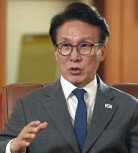By-elections See Unexpected Competitive Structure
By-elections See Unexpected Competitive Structure
Posted April. 30, 2009 08:18,
These by-elections showed an unexpected competitive structure.
In the run-up to the by-elections yesterday, politicians talked of the unexpected features of the by-elections.
Most of all, the competitive structure remained unclear. The by-elections were designed to elect five lawmakers 14 months after President Lee Myung-bak was sworn in and 12 months after last years general election.
Both the ruling Grand National Party and the main opposition Democratic Party, however, engaged in intra-party competition in their own regional strongholds.
In Gyeongju, North Gyeongsang Province, the ruling party`s Jeong Jong-bok, a confidante of President Lee, and independent candidate Jeong Soo-seong, who is close to former party chairwoman Park Geun-hye, faced off. Park, called the "queen of elections," has not yet mentioned the by-elections.
Former Unification Minister Chung Dong-young, who ran for president in December 2007 for the Democratic Party, left the party to run as an independent in the Deokjin district of Jeonju, North Jeolla Province. The party did not nominate him to run in that district.
In response, the Democratic Party sought to dent Chungs reputation.
As the ruling and opposition parties could not guarantee victory in their own strongholds, they feared the possibility of losing all five posts. Both parties also stressed that party leaders should take responsibility for failure.
Some even complained that yesterdays by-elections were internal feuds. To avoid taking responsibility for failure, party leaders made an all-out effort to win the by-elections.
Due to the unexpected competitive structure, voters could not compare the political stance and policies of the ruling party with those of opposition parties. Though the ruling party emphasized economic recovery and nominated economic experts as candidates in Incheon`s Bupyeong district and Ulsan`s Buk district, its candidates drew little attention.
In Bupyeong, the ruling party even promised to issue a revised supplementary budget to revive the struggling GM Daewoo Auto and Technology, but this simply showed the gap in opinions between the government and the ruling party.
The Democratic Party said the by-elections would be an opportunity to judge the Lee administration. With the investigation into the Taekwang bribery scandal spreading to former President Roh Moo-hyun, however, the main opposition partys voice has weakened.
Instead, the ruling party has raised its voice to encourage voters to judge the former Roh administration.
In by-election campaigns, each partys prominent figures, not candidates, drew attention. In Bupyeong, voters even told former Democratic Party Chairman Sohn Hak-kyu that they were unaware of the partys candidate but that they would vote for him anyway.
In Ulsan`s Buk district, ruling party lawmaker Chung Mong-joon even visited public baths to support his partys candidate. Critics say support from prominent figures could encourage people to vote without knowledge of candidates policies or qualifications.
In Ulsan, the progressive Democratic Labor Party and the New Progressive Party fielded a unified candidate three days before the by-election.
Lee Gyeong-heon, CEO of the political consulting company Force Communication, said, By-elections have usually been considered an opportunity to judge the ruling party and understand the public perception of opposition parties efforts to keep the ruling party in check. But yesterdays by-elections have been distorted significantly.
jin0619@donga.com





![[천광암 칼럼]장동혁은 대체 왜 이럴까](https://dimg.donga.com/c/138/175/90/1/wps/NEWS/IMAGE/2026/02/22/133399127.1.jpg)

